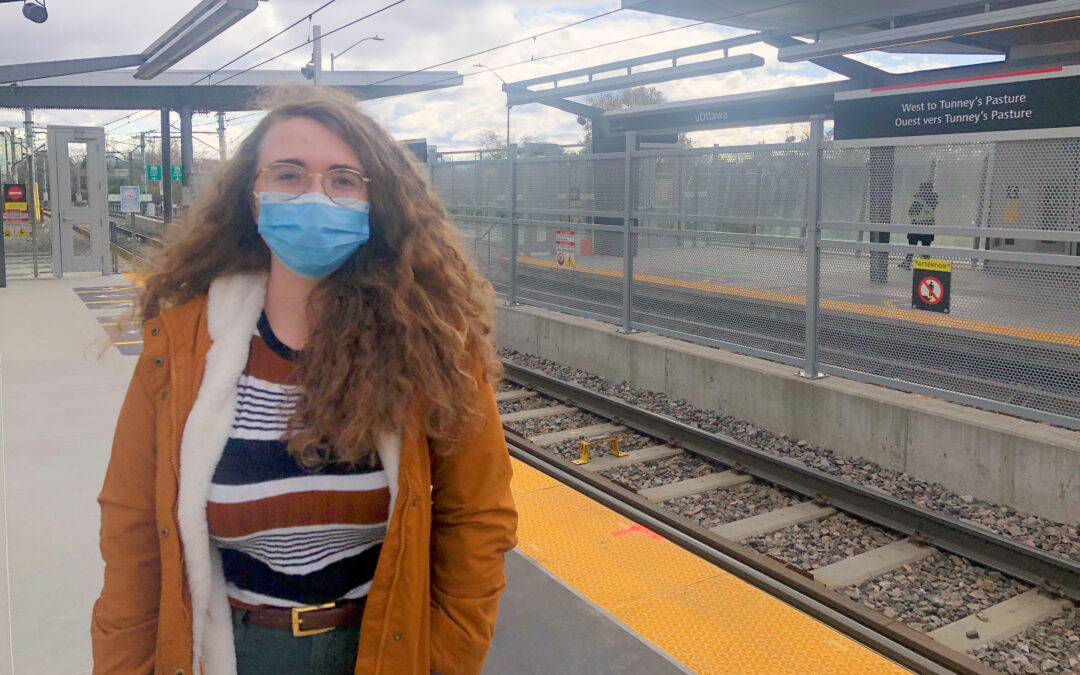Anne Akin, 20, is a student at UOttawa who looks forward to the public inquiry into the LRT disruptions. Photo by Rukhsar Ali.
by Rukhsar Ali and Amitava Kar | Nov. 19, 2021 | News |
Young transit riders said Friday they are not convinced a public inquiry into Ottawa’s recently reopened light-rail transit system will fix its issues for good.
The goal of the inquiry is to get to the bottom of the continuous service disruptions facing the LRT’s Confederation line, Caroline Mulroney, Ontario’s Minister of Transportation, said in a press release Wednesday.
LRT service resumed on Nov. 12 after it was down for 54 days due to a derailment which inconvenienced thousands of Ottawa residents. But within the first week of reopening, two of the city’s trains came to a forced stop — each for almost an hour — causing more delays for returning commuters, including students commuting to and from school.
“I’m glad they’re looking into it, and I hope it’s not like a fluff thing and they actually look into what the problems are,” said Anne Akin, a University of Ottawa biology student who commutes to campus from Stittsville, a community approximately 30 kilometres west of downtown Ottawa.
“I don’t really know the difference between a public and a judicial inquiry, but I know that a good number of people, including Mayor Jim Watson, voted against the judicial inquiry, so I kind of wanted it to happen.”
Confusion on what a public inquiry entails was a common theme among students who spoke to The Raging Twenties about the upcoming probe.
Public inquiries are seen as more transparent than judicial inquires because of the publicity they enjoy and the number of witnesses that are called, according to a judicial report.
Some members of Ottawa’s city council, who have been pushing in recent weeks for greater transparency into the issues related to LRT service and maintenance, praised the news.
“The inquiry will answer some important questions, such as why the LRT keeps breaking down despite so much money and expertise being invested in it,” Kitchissippi Coun. Jeff Leiper said.
The city has other ways of looking into the LRT problem, such as a judicial inquiry or an internal audit by the auditor general. But Leiper favors a public inquiry into the issue as the best possible option.
“The city has approved an inquiry by the auditor general, but frankly speaking, the auditor general does not have the power or resources to see this through,” Leiper said.
He added young people should be more engaged in city hall and raise their voices to hold the city government accountable. “The kind of affordable and environmentally-sustainable cities young people want to live in largely depend on an efficient mass transit system,” Leiper said.
Emily Gough, 22, a psychology student at the University of Ottawa, said she isn’t happy with the LRT’s performance.
“When I first came to Ottawa in 2017, I was really excited about having a more robust transit system here,” said Gough, who moved from Halifax to attend school. “But over the years, I’ve just been extremely disappointed with how OC Transpo has regulated itself.”
She said there’s been a lot of “inaction by the municipal government” when it comes to the LRT and wants a more reliable commuting experience.
Gough said offering free transit for OC Transpo commuters for the month of December isn’t enough compensation for students who already pay for semester-long bus passes.
“As a student, I’m already paying $400 to have a transit pass, so I wasn’t really appreciative of what they did,” Gough said. “It’s not free for me. I’m still paying for it and I’m not getting reimbursed.”

